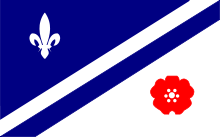Franco-Albertans
| Franco-Albertains | |
|---|---|
 Franco-Albertan flag | |
| Total population | |
| (225,500) | |
| Regions with significant populations | |
| Alberta | |
| Languages | |
| Canadian French, Canadian English | |
| Religion | |
| Mainly Roman Catholic | |
| Related ethnic groups | |
| French Canadians Métis Acadians French |
Franco-Albertans (French: Franco-Albertains) are an extended community of French Canadians or French-speaking people living in the Canadian province of Alberta.
History
French history in Alberta goes back to the fur trade in North America when voyageurs (travelling traders) with the Montreal-based North-West Company arrived in the late 1780s. These explorers mingled with the local First Nations (often Cree) and give rise to the Métis in Alberta. At home and with each other many Métis families spoke a language that developed out of French and Cree called Mitchif, but they were generally also fluent in both French and Cree (Mitchif’s complex grammar suggests it was not a pidgin but the product of mixing by fluent speakers). Along with new arrivals from Canada East, continued to make up a large percentage of the workforce in the Hudson’s Bay Company after it took over the NWCo. in 1821, and French was the primary European language spoken in what later became Alberta until the 1870s.
After Canada acquired Rupert’s Land (which included the future Alberta) from the HBCo., more francophones arrived from Eastern Canada, the United States, and Europe, this time to settle and found agricultural communities. They were later joined by urban migrants, and there are now French quarters in both Calgary and Edmonton.
However, in 1892, the Northwest Territories (which at the time covered the Canadian Prairies west of Southern Manitoba) abolished French as an official language. In 1984, its status as an official languages was restored in the Canadian territories, but not in the prairie provinces.
In 2011 81,085 Albertans spoke French as first language, giving Alberta the fourth largest francophone population in Canada after Quebec, Ontario, and New Brunswick. According to the 2011 Census information, Alberta's Francophone population is growing faster than any French-speaking population in Canada. The Francophone population grew by approximately 18% since 2006. In the 2006 census 12% of Albertans or 390,000 people claimed French or Acadian ancestry, making French the 3rd largest ethnic group in the province after British (including Scottish) and German. A combined total of 238,000 Albertans can speak French either as a first or additional language. In the 2011-12 school year 5,943 students in Alberta were enrolled in francophone schools (where French is the sole language of instruction except during the English Language Arts class) and 145,099 students in Alberta were taking French as a Second Language (FSL) classes.
Four municipalities in Alberta are officially bilingual and offer local services in French: Beaumont (15 kilometres (9.3 mi) southeast of Edmonton), Legal (35 kilometres (22 mi) north of Edmonton), Falher (420 kilometres (260 mi) northwest of Edmonton), and Plamondon (204 kilometres (127 mi) northeast of Edmonton).
Franco-Albertans are concentrated in communities such as Legal, Bonnyville, Plamondon, and St. Paul in the northeastern part of the province, northwest areas such as the hamlet of St. Isidore, Municipal District of Smoky River No. 130 including the towns of Falher, Donnelly, McLennan and Girouxville and north central Alberta. Immigration from Quebec to Alberta in the 1970s and again in the 21st century has also increased the francophone population of the province, especially in the cities of Calgary, Edmonton and Fort McMurray.
L’Unithéâtre in Edmonton and the Société de Théâtre serve a French-speaking audience, and a number of folk dancing troupes tour the province. The Centre d’arts visuels de l’Alberta provides a venue for francophone artists and craftsmen, and the annual Franco-Alberta Festival showcases French language and culture.
The first notable Franco-Albertan, in many regards, was Father Albert Lacombe.
Other notable Franco-Albertans
- Chris Benoit - Professional wrestler. Born to a French-Canadian family in Montréal, but raised in Edmonton, and wrestled out of Calgary.
- Arthur Boileau - Former professional runner of French-Canadian descent. Represented Canada in the 1984 and 1988 Olympics in the Marathon. Born in Edmonton.
- Randy Boissonnault - Member of Parliament for Edmonton Centre.
- Jean Léon Côté - Franco-Albertan politician.
- Denis Ducharme - Franco-Albertan politician.
- Gregg L. Friedman MD - Psychiatrist-Alberta Medical Doctor
- Wilfrid Gariépy - founding Franco-Albertan/Canadian politician.
- Robert Goulet - American entertainer of French-Canadian parentage and Franco-Albertan residency. Migrated with his French-Canadian family from Massachusetts to northern Alberta when he was three months old. Was rumoured to be seeking Canadian citizenship, but died in 2007 before any action could be taken.
- Hector Goudreau - Alberta Minister of Tourism, Parks, Recreation and Culture (2006–present).
- Prosper-Edmond Lessard - Alberta’s first French-speaking cabinet minister and Senator.
- Les Bûcherons, a duo which presents French-Canadian music and dance to audiences throughout the province.
- Benoît Pariseau - Author and broadcaster. He is also a distant cousin of former Québec premier Jacques Pariseau.
- Leo Piquette - Alberta politician, francophone minority right advocate.
- Crystal Plamondon - Franco-Alberta singer and songwriter.
- Édouard Hector Rouleau - Medical doctor, Conservative Politician, pioneer of Calgary.
- Claudette Tardif - francophone Canadian Senator for Alberta, of Russian descent.
See also
- Franco-Albertan Flag
- French Canadian
- Franco-Columbian, Franco-Manitoban, Franco-Ontarian, Fransaskois, Franco-Ténois
External links
- French-Canadian Association of Alberta (ACFA)
- ACFA régionale d'Edmonton
- Le Franco
- Alberta's Francophone Heritage Website
- Connexion Carrière - Centre de recherche d'emploi